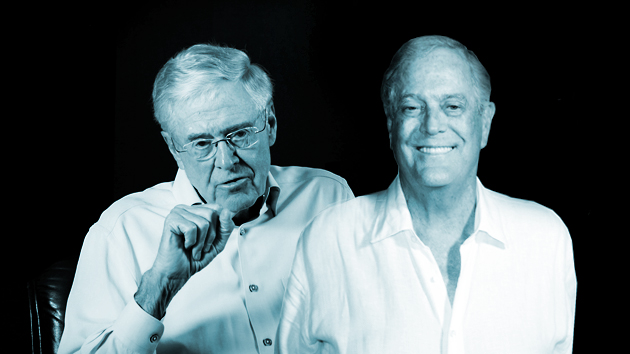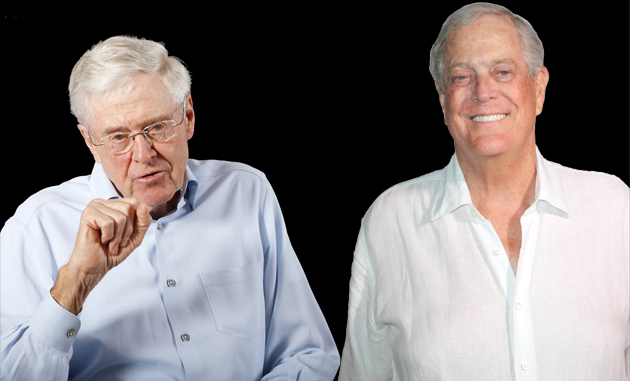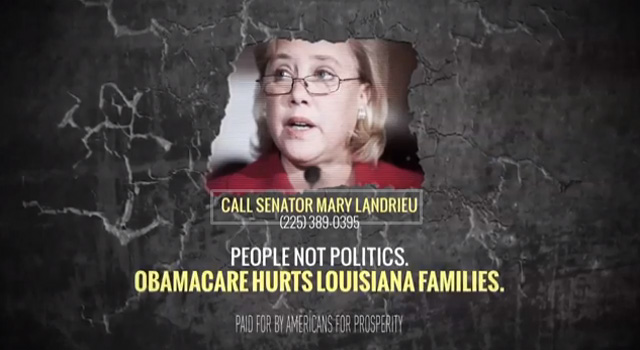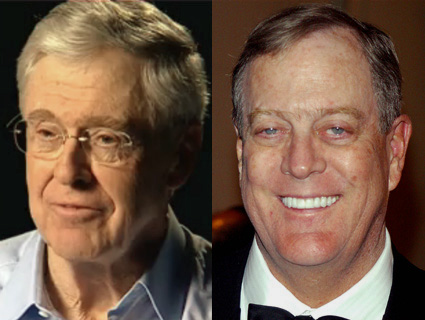
Charles Koch: Bo Rader/ZUMA; David Koch: Sonia Moskowitz/ZUMA
There’s one main rule at the conservative donor conclaves held twice a year by Charles and David Koch at luxury resorts: What happens there stays there.
The billionaire industrialists and their political operatives strive to ensure the anonymity of the wealthy conservatives who fund their sprawling political operation—which funneled more than $400 million into the 2012 elections—and to keep their plans private. Attendees of these summits are warned that the seminars, where the Kochs and their allies hatch strategies for electing Republicans and advancing conservative initiatives on the state and national levels, are strictly confidential; they are cautioned to keep a close eye on their meeting notes and materials. But last week, following the Kochs’ first donor gathering of 2014, one attendee left behind a sensitive document at the Renaissance Esmeralda resort outside of Palm Springs, California, where the Kochs and their comrades had spent three days focused on winning the 2014 midterm elections and more. The document lists VIP donors—including John Schnatter, the founder of the Papa John’s pizza chain—who were scheduled for one-on-one meetings with representatives of the political, corporate, and philanthropic wings of Kochworld. The one-page document, provided to Mother Jones by a hotel guest who discovered it, offers a fascinating glimpse into the Kochs’ political machine and shows how closely intertwined it is with Koch Industries, their $115 billion conglomerate.
The more than 40 donors courted by the Kochs include hedge fund and private-equity billionaires, real estate tycoons, and executives of top corporations, including Jockey International and TRT Holdings, owner of Omni Hotels and Gold’s Gym. A number of them have never been identified as members of the Koch donor network, including Schnatter, one of the more prominent names on the list. An outspoken opponent of the Affordable Care Act, he is a longtime Republican donor who hosted a fundraiser for Mitt Romney’s presidential campaign. The document notes that the pizza mogul was scheduled to meet with Ryan Stowers, the director of higher education at the Charles G. Koch Foundation. (Schnatter did not respond to requests for comment.)
Another top conservative contributor on the list is TRT Holdings’ cofounder Robert Rowling, whose net worth is estimated at $4.9 billion. During the 2012 election, Rowling directed $3.5 million to American Crossroads, the super-PAC spearheaded by Karl Rove, and he cut a $100,000 check to the pro-Romney super-PAC Restore Our Future. According to the document, Rowling was scheduled to sit down with Charles Koch at the “Koch residence”—presumably a reference to the Wichita businessman’s vacation home at the Vintage Club, a short drive from the resort where the donor conference was held. Top Koch operatives were expected to participate in this session, including Kevin Gentry, the Koch brothers’ fundraising guru; Daniel Garza, the director of the Libre Initiative, a Koch-funded organization dedicated to Latino outreach; and Marc Short, who runs Freedom Partners, the centerpiece of the Kochs’ political network, which distributes donor funds to a large web of conservative nonprofit groups. (Rowling did not respond to requests for comment.)
Other heavy hitters slated for meetings with the Koch brothers or their representatives included Carl Berg, a Silicon Valley real estate tycoon worth $1.1 billion; Ken Griffin, who founded the hedge fund Citadel and clocks in at No. 103 on the Forbes 400 (net worth, $4.4 billion); John W. Childs, a top private-equity investor; and Fred Klipsch, the chairman of the headphone and speaker company Klipsch Group.
The meeting list illustrates the interwoven nature of the Koch brothers’ corporate, political, and philanthropic activities. The donor meetings featured various senior Koch Industries executives, including the company’s chief financial officer, Steve Feilmeier. He was scheduled to join Charles Koch for a sit down with Berg. Charles Koch’s 36-year-old son, Chase, the president of Koch Fertilizer, was also scheduled to take part in a meeting with a donor named George Gibbs. (Koch Industries spokesman Rob Tappan would not comment on the conference document, only confirming that company employees attend the donor summits. Freedom Partners spokesman James Davis said he was “uncertain” about the document and did not respond to further questions.)
At least half of the one-on-one sessions involved representatives of Americans for Prosperity, the political advocacy group founded by the Koch brothers and their top political adviser and strategist, Richard Fink, a Koch Industries executive vice president and board member. The AFP officials called to duty for these discussions included AFP’s president Tim Phillips, chief operating officer Luke Hilgemann, vice president for state operations Teresa Oelke, and vice president for development Chris Fink (Richard Fink’s son). The state directors for AFP’s Wisconsin, Michigan, Pennsylvania, and Florida chapters were also slated for tête-à-têtes during the Koch summit. (AFP spokesman Levi Russell declined to comment on the meeting document.)
In the past, Koch Industries has distanced itself from AFP and its political activities. The company has said the group is just one of “hundreds of organizations” that receive funding from the Kochs and that it operates “independently” of Koch Industries. But the document suggests a close collaboration between officials of Koch Industries, AFP, and Freedom Partners, whose staff and board are stacked with numerous current and former Koch Industries employees. Michael Lanzara and Jeff Noble, who transitioned over to Freedom Partners from Koch Companies Public Sector—the company’s legal, lobbying, and public affairs branch—were scheduled to meet with donors alongside AFP staffers. The Koch brothers and Richard Fink were also listed as taking part in some of these sessions. (Fink, a man of many hats within the Koch firmament, is also an AFP board member; David Koch chairs the board of the Americans for Prosperity Foundation.)
Heading into the midterm elections, AFP has emerged as one of the right’s most active and well-financed political outfits. In recent months, it has spent more than $20 million on ads clobbering congressional Democrats for supporting Obamacare. And the group is merely one piece of the Kochs’ massive political operation, which in size, scope, and fundraising prowess has come to resemble a political party in its own right. During the 2012 election cycle, in fact, the Koch network managed to raise as much as the Republican National Committee itself.
After the brothers and their allies failed to win the Senate or unseat Obama in 2012, David Koch told Forbes that this setback would do little to deter them: “We’re going to fight the battle as long as we breathe.” At the Palm Springs conference, as the left-behind-list of VIP meetings shows, the Kochs are lining up serious financial firepower for the political fights of 2014 and beyond.
Read the meeting list, along with a guide to the participants in them, below.
DONORS
Carl Berg: Ranking No. 308 on the Forbes 400, Berg is a Silicon Valley real estate titan with an estimated fortune of $1.1 billion.
Ronnie Cameron: He runs agribusiness giant Mountaire Corporation. During a meeting of the Kochs’ donor network in 2011, Charles Koch recognized Cameron (and other donors) for donating at least $1 million to their cause.
Charles Chandler: Based in the Kochs’ hometown of Wichita, Kansas, Chandler is the CEO of Intrust Bank.
John Childs: He runs the Boston-based private equity firm J.W. Childs & Associates.
Jamie Coulter: Haling from Wichita, Coulter is the former CEO of the Lone Star Steakhouse and Saloon restaurant chain.
Bob and Steve Fettig: The Fettigs run the metal fabrication company Tankcraft, based in Darien, Wisconsin. Steve is the company’s CFO; Bob is CEO.
Richard and Leslie Gilliam: Richard founded Virginia-based coal mining company Cumberland Resources Corporation, which he sold to Massey Energy for nearly a billion dollars in 2010.
Ken Griffin: A major conservative donor, the Chicago-based businessman founded the hedge fund Citadel and is worth an estimated $4.4 billion.
John Griffin: He’s the founder of Blue Ridge Capital, a New York hedge fund.
Dick Haworth: He’s the chairman emeritus of Holland, Michigan-based office furniture company Haworth.
Richard “Ric” Kayne: He’s the founder and chairman of Los Angeles-based investment firm Kayne Anderson Capital Advisors.
Dan Kirby: He’s president of Sioux Falls, South Dakota-based Kirby Financial.
Fred Klipsch: He’s the chairman of Klipsch Group, a speaker and headphone manufacturer.
Frank Kozel: He’s the principal of Pittsburgh-based Keystone Energy Oil & Gas Inc.
Francis “Franc” Lee: He’s the president and CEO of Flowood, Mississippi-based lender First Tower, LLC.
Robert “Bob” Luddy: He’s president of CaptiveAire Systems Inc. in Raleigh, North Carolina.
Hugh Maclellan: He’s the executive chairman of Chattanooga, Tennessee’s Maclellan Foundation, which make grants to Christian causes.
Cecil O’Brate: He’s the CEO of Garden City, Kansas-based Palmer Manufacturing & Tank.
Verl Purdy: He’s the chairman and CEO of Charlotte, North Carolina-based AGDATA Inc.
Tom Rastin: He’s a director and vice chairman of the Mount Vernon, Ohio-based Ariel Foundation, started by his wife, Karen Buchwald Wright, the CEO of Ariel Corporation. Rastin is the company’s vice president of engineering, sales, and marketing.
George Records: A member of the Hoover Institution’s board of overseers, Records is the retired chairman of Oklahoma City’s Midland Group.
Robert Rowling: Ranking No. 93 on the Forbes 400 with an estimated fortune of $4.9 billion, Rowling is the cofounder of TRT Holdings, which owns Gold’s Gym and Omni Hotels.
John Schnatter: He’s the founder and CEO of Papa John’s International.
Tina and Craig Snider: They are the children of Ed Snider, a founding contributor of the Ayn Rand Institute and chairman of Comcast Spectacor, a sports and entertainment company that owns the Philadelphia Flyers.
Dian Stai: Based in Texas, Stai cofounded Owen Healthcare Inc. with her late husband. She’s a top conservative donor who gave $125,000 to the pro-Mitt Romney super-PAC Restore Our Future during the 2012 election cycle.
Jim Stephenson: He’s the president and CEO of Georgia-based Yancey Bros. Co., “which provides Caterpillar, AGCO, and Blue Bird Bus Co. products and services throughout the state of Georgia.” Stephenson is also an Americans for Prosperity board member.
Jim Von Ehr: He’s the CEO and founder of Richardson, Texas-based Zyvex Labs.
Debra Waller: Since 2001, she’s been the chairman and CEO of Jockey International Inc.
Lew Ward: He’s the founder of Oklahoma-based Ward Petroleum Corporation.
Dick Weiss: He’s the Core Equity senior portfolio manager at Wells Capital Management.
Karen Wright: She’s the founder and CEO of the Ariel Foundation, a private philanthropy group based in Mount Vernon, Ohio. She’s also CEO of the Ariel Corporation, a natural gas compression company.
*Mother Jones was unable to confirm the identities of some donors on the list, including Steve Clark, Paul Foster, George Gibbs, George Jenkins, Jerry Hayden, Kent McCarthy, Andrew Miller, Ted Saunders, Tom Smith, Jaime Snider, and Dean Williams.
“PLAYERS”
Charles Koch: He’s the chairman and CEO of Koch Industries.
David Koch: He’s Koch Industries’ executive vice president and a board member.
Michael Lanzara: A former director for special projects at Koch Companies Public Sector, Lanzara now works for Freedom Partners.
Steve Feilmeier: He’s chief financial officer and executive vice president of Koch Industries.
Kevin Gentry: A vice president at Koch Companies Public Sector, Gentry is the Koch brothers’ top fundraiser. He also serves on the board of Freedom Partners.
Jeff Noble: A former senior development associate at Koch Companies Public Sector, Noble currently works for Freedom Partners.
Tim Phillips: He’s the president of Americans for Prosperity, the political advocacy group founded by the Koch brothers and Richard Fink.
Chris Fink: He’s Americans for Prosperity’s vice president of development and the son of Richard Fink.
Teresa Oelke: She’s Americans for Prosperity’s vice president for state operations.
David Fladeboe: He’s the state director for Americans for Prosperity-Wisconsin.
Brett Hinkey: A former senior development associate at Koch Companies Public Sector, Hinkey now works for Freedom Partners.
Daniel Garza: He’s the executive director of the Libre Initiative, a Koch-funded nonprofit focused on Hispanic outreach.
Chase Koch: He’s Charles’ son and the president of Koch Fertilizer.
Richard Fink: He’s the chairman and CEO of Koch Companies Public Sector and a board member of Koch Industries. A founder of the Mercatus Center and Americans for Prosperity, Fink is the Koch’ top strategist and political adviser.
Ryan Stowers: He’s the director for higher education at the Charles G. Koch Foundation.
Brian Hooks: He’s the executive director and chief operating officer of the Mercatus Center.
Marc Short: Short heads Freedom Partners, the centerpiece of the Koch brothers’ political operation. Short is a former chief of staff of the House Republican Conference.
Scott Hagerstrom: He’s the state director of Americans for Prosperity-Michigan.
Jennifer Stefano: She’s the state director for Americans for Prosperity-Pennsylvania.
Tommy Von der Heydt: He’s a former regional development officer for Americans for Prosperity.
Corey Lewandowski: He’s the East Coast regional director for Americans for Prosperity.
Slade O’Brien: He’s state director of Americans for Prosperity-Florida.
John Hardin: He’s a program manager at the Charles G. Koch Foundation.
Michael Palmer: He is the president of i360, which bills itself as the “leading data and technology resource for the pro-free-market political and advocacy community.” Palmer’s firm has worked closely with the Kochs’ voter microtargeting operation, Themis.
Derek Johnson: He’s a program officer for higher education at the Charles G. Koch Foundation.
Nathan Nascimento: He’s an employee of Freedom Partners.
James Davis: He’s the vice president of strategic communications at Freedom Partners.
Luke Hilgemann: He’s Americans for Prosperity’s chief operating officer.










